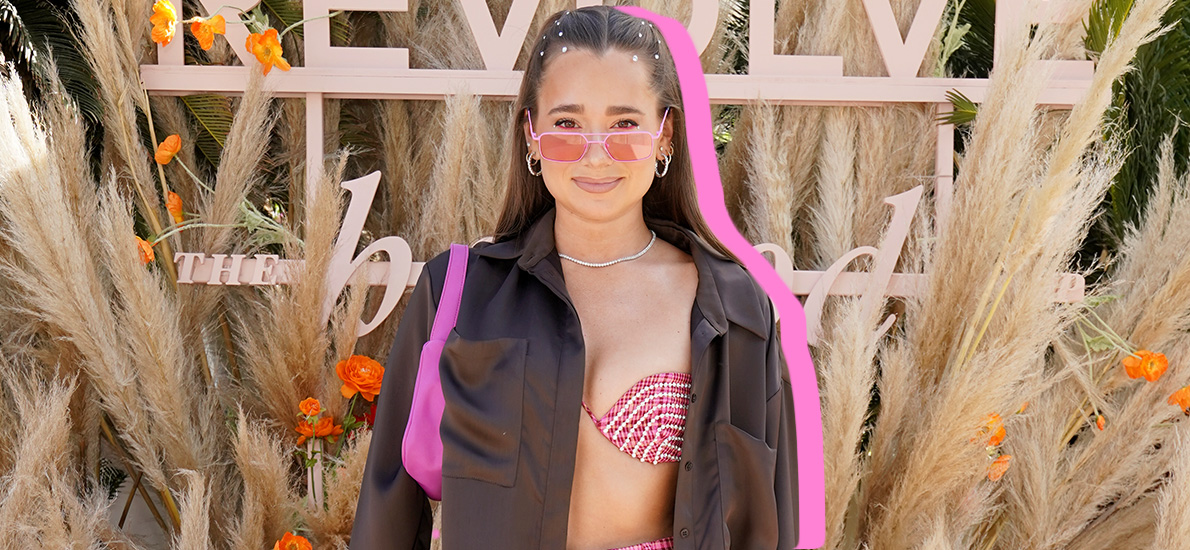If you trust an influencer’s skin care recommendation, would you trust them with your financial information? That’s what Danielle Bernstein, founder of WeWoreWhat, is betting on. Earlier this month, the influencer and designer announced she is partnering with fintech company Imprint on the WeWoreWhat Rewards Visa® Card, the first of its kind. The card offers WeWoreWhat fans extra cash back on her brand, as well as a curated list of businesses. The Magnises vibes are strong, but is the card really a one-way ticket to Scam City?
Although Business of Fashion declared in a headline, “Danielle Bernstein Is Launching A WeWoreWhat Credit Card,” The WeWoreWhat rewards card is not a credit card—at least, not yet. For now, it’s a debit rewards card that allows users to sign up by downloading the Imprint app and linking their bank account, a process a spokesperson for Imprint likened to joining Venmo. Some Instagram commenters are leery of handing over the keys to their debit cards to Bernstein, and one Instagram commenter wrote, “I would not trust her with my financial information”—but Bernstein herself is not receiving anyone’s bank account information. Imprint, a fintech company that started in 2020, is. Bernstein’s is their first influencer rewards card, although the company has also partnered with hospitality brand Selina, and RealSelf, an online directory of cosmetic procedure providers.
In addition to receiving a $10 welcome bonus, users can earn 10% cash back on purchases at WeWoreWhat (Bernstein does not otherwise receive a portion of purchases made via the card), 5% at various partner brands, and 1% everywhere else. Partner brands include scene-y NYC restaurants like Lola Taverna and Jack’s Wife Freda, and Instagram-friendly brands like What Goes Around Comes Around and Stephanie Gottlieb Jewelry. Unlike a cash rewards credit card, the cashback earned via the WeWoreWhat Rewards Visa® Card can’t actually be deposited into a cardholder’s bank account, just redeemed on future purchases at WeWoreWhat or any of the other partner brands.
“WeWoreWhat is always looking for new ways to give our community innovative value, benefits, and experiences,” Bernstein told BusinessWire. “I love that we will not only reward WeWoreWhat’s loyal customers but also provide them exclusive benefits across all of the brands and restaurants that are a part of my daily life,” she added. At the time of publication, Bernstein did not respond to a request for comment about the reception of the card or details about the credit card.
Sarah DelRosso, 29, has been following Bernstein on Instagram since 2020 and has purchased a few items from WeWoreWhat. “I actually love her brand,” she says. DelRosso signed up for the card last week, shortly after it was announced, which she says was “a pretty straightforward process.” The decision to sign up “was kind of a no-brainer,” she says, “because I shop at a lot of the same places that [Bernstein] shops.” (DelRosso regularly eats at Jack’s Wife Freda and goes to Maman on weekends.) She doesn’t use her credit card much and likes how the WeWoreWhat Card is “basically an extension of your debit card,” or similar to using Apple Pay.
So: is it a scam?
“Generally speaking, if you’re looking for rewards, a credit card is a better choice,” says Matt Schulz, Chief Credit Analyst at Lending Tree, adding, “Although this WeWoreWhat card is an example of how that’s changing some.”
“I think that if you’re somebody who spends a lot of money with WeWoreWhat, you could do worse,” he says, noting that getting 10% back on a debit card is “really interesting.” Debit rewards in general are hard to find, and even on a credit card, users would typically see somewhere from 1%-3% cashback offered. That said, if you’re not a fan of the Bernstein-approved brand of Instagram traps, the card won’t offer you much.
Some people are skeptical, though, so much so that Bernstein limited comments on her post announcing the card. Some took their concerns to Twitter. “Billy McFarland who?” replied one Twitter user to Business of Fashion’s tweet. “Talk about predatory lending!” wrote another. (No lending is involved—at least not yet. “When a transaction is made with the card, funds are automatically transferred from a user’s bank account, which means they can never overspend and don’t need to worry about overdrafting or fees,” said the Imprint spokesperson.)
“I think a lot of the fiery comments that are out there are simply based on a misunderstanding of the difference between a credit card and a debit card,” Schulz says. That said, celebrity cards—credit or otherwise—do have a checkered past, so some distrust is natural. The Kardashian Kard, a prepaid debit card that launched in 2010 and shuttered weeks later, was declared “a rip-off” by Forbes due to its exorbitant activation and monthly fees. Perhaps the most well-known of the celebrity card catastrophes is the RushCard, started by Russell Simmons in 2003, which infamously caused chaos for some 400,000 users in 2015 when a software glitch left users unable to access their money for weeks.
“It’s wise for people to be skeptical when they see offers from really anybody,” Schulz says, adding, “But it is also important to understand that just because something is from a celebrity doesn’t necessarily mean that it’s sketchy.”
For some people, though, which celebrity a card comes from does matter, and Bernstein herself has had her fair share of controversies in recent years that have lost her some public trust. In late 2020, she was sued by a Brooklyn-based lingerie company, The Great Eros, for allegedly copying their designs. (Bernstein denied any allegations of theft.) In July 2020, she was accused of ripping off a small business’s mask design after she’d previously reached out to the business requesting samples of their masks. Bernstein, however, responded, “the accusation that I stole or solicited the designs are false and I have shared receipts of emails proving that these claims are not true.” She later donated all the masks and also donated 5,000 surgical masks to frontline healthcare workers. In 2018, several pieces from Bernstein’s jewelry line, which was a collaboration with Lulu DK, were pulled from Nordstrom after she was accused of copying the designs from other brands. Even amidst all the controversies, Bernstein’s large following has continued to grow, and she currently has 2.8 million Instagram followers.
DelRosso says the controversies haven’t impacted her decision to support Bernstein’s brand. “I feel like when you’re an influencer, there’s always going to be some negative press to whatever you do.”
“I’m gonna continue to buy things from her brand because I like supporting her brand,” she says.
When asked if she felt any hesitation to get the card, DelRosso said, “It looked like a reliable app. And I downloaded the app before I linked my debit card, and nothing really looked suspicious to me.”
As far as the credit card aspect goes, Business of Fashion reports a WeWoreWhat Visa Rewards Credit Card is planned for “later this year” and said, “terms for the credit card are still being ironed out, though they will not include an annual fee, foreign transaction fees, or balance transfer fees.”
If a credit card does come to fruition, that’s where things could potentially get dicier. The absence of an annual fee isn’t really a selling point, since that’s common for retail credit cards. “The main issue is almost always the interest rate,” says Schulz.
“The average rate on a new store credit card is about 24% and can go up to near 30%. That’s a really, really high number and is even higher than what we see on other types of credit cards,” he says. And while consumers can avoid incurring those interest rates by paying off their balance in full each month, sometimes life gets in the way. The credit card could be appealing to WeWoreWhat fans, though, if the cashback percentage is the same as the debit card. “If the interest rates are as high as those on most retail cards, however, folks may be better served looking elsewhere.”
A spokesperson for Imprint declined to comment on how many users have signed up for the WeWoreWhat Rewards Visa® Card since its launch. And whether it’s a credit card or a debit card, Schulz advises consumers to do their research and proceed with caution. “Anytime you’re giving your bank account information to a company, that’s something to not enter into lightly,” he says. “While a debit card doesn’t [allow] you to run up tons of debt that you can’t pay, it does make it a lot easier to spend money in your account, and that can cause all sorts of issues in and of itself. So, it is important for you to be careful about who you give your financial information to who you trust online.”
Bottom line, “If something doesn’t feel right, or you don’t quite trust a company, a bank, a retailer—trust your gut and take your business elsewhere.”
Images: Presley Ann/Getty Images for REVOLVE




















































